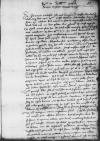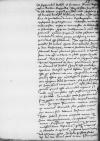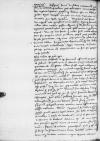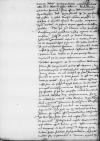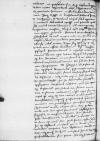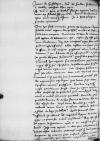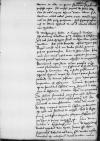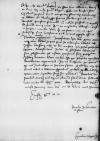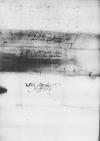Letter #2531
Cornelis DE SCHEPPER & Godschalk ERICKSEN (SASSENKERLE) to Ioannes DANTISCUSBrussels, 1542-01-30
English register:
Having returned from Germany, where he stayed with the Landgrave of Hesse [Philip I] and the Archbishop of Köln [Hermann von Wied], among others, De Schepper received two letters from Dantiscus dispatched in August [1541]. The first one mentioned Gdańsk beer, and the other moose antlers. De Schepper is glad that Dantiscus is well.
He reports that (in accordance with instructions from [Nicolas Perrenot de] Granvelle,) he sent the antlers to Ioanne de Burgoigne. He encloses Granvelle’s letter to Dantiscus [IDL 2519]. The beer reached Bruges, and has been drunk by Queen Mary [of Hungary] and the Queen of Scotland’s sister [Louise de Lorraine, sister of Mary of Guise]; the latter having never tried beer, she drank it with repugnance (cum nausea). Many think this beer has medicinal properties, because when De Schepper added wild ginger (asara baccara) and laurel berries (lauri baccae) to it, it helped his wife [Elisabeth Donche] with her cough.
De Schepper reports that the Emperor [Charles V] ended the Diet of Regensburg (July [1541]) and travelled to Italy, and that the Christians were defeated at Buda. He locates the cause of the defeat in the passivity of the German dissidents and the gullibility of Brother George [Utješenović], Bálint Török and other Hungarians as regards Turkish promises.
Next he describes the Emperor’s unsuccessful expedition to Algiers to retake the towns captured by Turkish and Moorish pirates. Many courtiers lost some of their property during the expedition, and a large part of the fleet was destroyed, but no one of importance was killed. De Schepper’s brother-in-law Cornelis van Zegherscapelle took part in the expedition. Upon returning, the Emperor went to Valladolid and plans another expedition to Africa. In the Low Countries, thanksgiving prayers were ordered for the Emperor’s safe return from the expedition.
De Schepper outlines the growing threat from France towards the Low Countries and Germany. The King [Francis I of Valois] demanded that the Duke of Lorraine [Antoine le Bon] hand over the territory of Chȃtenois. It is a convenient place from which to attack the Duchy of Luxembourg and the bishoprics of western Germany. The Germans fail to see this danger, the Emperor is depleting his strength on the war with the Turks and internal conflicts, and meanwhile France is growing in strength. Recently the Emperor was accused that he was going to be the undoing of the Christian world. De Schepper, like Dantiscus, wants to withdraw from politics.
De Schepper reports that the Admiral [Philippe de Chabot] has regained his influence in France. With the help of the King’s mistress [Anne de Pisseleu d'Heilly] he has removed Constable [Anne] de Montmorency from power.
De Schepper claims that the real cause of the animosity between the Emperor and the King of France and of the impending war was not the occupation of Milan or the Kingdom of Navarre, but divine anger at people’s sins. Last summer many thousands of people also died of the plague in Germany. De Schepper notes with horror the King of France’s intense drive to seize imperial power. He sees this as a realistic possibility in the face of the discord and the decline of military virtues in Germany. Some Germans have even sworn allegiance to the King of France. De Schepper cites historical examples of empires collapsing. He also writes that rumours are circulating that the French will officially propose moves against the Emperor [at the Diet] in Speyer. An assembly was held recently in the Netherlands at which the people were informed how to behave if an enemy invasion occurred.
De Schepper outlines the situation in the Baltic region. Christian [III of Oldenburg], King of Denmark, rejected the imperial envoy’s proposal to extend the truce. Similarly, the King of Sweden [Gustav I Vasa] is readying for war. Therefore the Low Countries have written to the rulers of Poland and the Baltic duchies and towns, informing them of possible impediments to trade and navigation in case of war.
De Schepper reports that after the battle at Buda, Godschalk [Ericksen] together with Bartholomeus Haller and Miklos Oláh found themselves within Queen Mary’s Hungarian estates, which they left upon a request from the residents, who feared that the presence of an imperial envoy would bring the Turks’ wrath upon them. Oláh travelled to the court of the Roman King [Ferdinand], and Haller to Nuremberg, while Godschalk returned to the Low Countries. The Archbishop of Palermo [Jean Carondelet] has removed himself from the court; he is the provosth of St. Donatian’s in Bruges and sends greetings to Dantiscus.
De Schepper describes the ecclesiastical career of Georg of Austria and his imprisonment by the King of France, who gave as his reason revenge for the death of French envoys Cesare Fregoso and Antonio Rincon, allegedly murdered by the Emperor’s servants in the Duchy of Milan. In De Schepper’s view, they fell victim to robbers, while Georg of Austria was imprisoned because the residents of Liège disliked him as their new bishop.
De Schepper reports that Maximiliaan van Egmond is well and is in Friesia. Johan [Cirksena], Count of East Frisia, has married Emperor Maximilian’s illegitimate daughter [Dorothea of Austria]. Young van Gaasbeek, the Lord of Heule [Wouter van der Gracht] and Frédéric de Melun are well. Lord of Praet suffers from gout. His son [Johan of Flanders] has married the daughter [Jacqueline] of the Lord of Beveren [Adolf of Burgundy].
De Schepper reports on the latest news from Hungary about the Turkish invasion and on the capture of Marano [Lagunare] by those serving the King of France. If the King does not want Marano, they supposedly intend to offer it to the Turkish Sultan [Suleiman the Magnificent]. He deplores the state of the times they live in, the imminent annihilation of Christianity and people abandoning the faith. He describes the symptoms of declining faith in individual countries in Europe.
De Schepper conveys words of devotion from Lazarus Tucher and Wolfgang Haller, who has three daughters. Haller’s wife is pregnant. De Schepper’s wife [Elisabeth Donche] is in Bruges with two daughters; the one from her first marriage [Catharina Laurijn] is to be married soon. De Schepper’s nine-year-old son is starting his education.
De Schepper reports that the bacularius [Adolphus de Scornaco] is busy with studies in Leuven, waiting for income from the prebend in Utrecht, while Lieven [Algoet] has gone with the Emperor to Africa and Spain. He also lists information about people Dantiscus knew from the imperial court: Lord of Courrières [Jean de Montmorency], [Philibert] of Montfalconnet, Lord of Roeulx [Adrien de Croÿ I], de Boussu, and Wilhelm von Rogendorf’s son [Christoph].
De Schepper offers his services as mediator in the correspondence with Eustathius [Knobelsdorf], who, having won a good reputation in Leuven as a polite and modest man, has gone to Paris.
Here starts the letter added by Godschalk Ericksen:
Having visited De Schepper in his absence caused by his being called to the court, Godschalk undertakes to continue writing the letter started by his friend. He conveys greetings to Dantiscus from himself and his acquaintances. The memory of Dantiscus remains forever in their hearts, sometimes fuelled additionally by beer from Jopen.
Godschalk is tired of serving [at the court] and intends to become a clergyman. He holds a canonry in Mayence, but the Duke of Holstein [Christian III of Oldenburg] is against his transferring his coat-of-arms there from Holstein and Denmark. Thanks to Johan Weze’s intercession, he received an appointment to a canonry in Liège from [Roman King] Ferdinand, but the new bishop of Liège appointed some boy instead, against whom Godschalk intends to bring a lawsuit in Rome. If he wins the lawsuit he will settle in Liège, his income supplemented with income the Emperor granted him from St. Nicholas’ Abbey in Veurne in Flanders.
Here continues the letter by Cornelis De Schepper:
Having returned from the court, De Schepper has found Godschalk’s additions to his letter. He does not doubt that Dantiscus will enjoy them. He reports that he has received orders to set off for Speyer the next day. He always remembers Dantiscus’ kindness to him. He conveys greetings to his brothers, sisters and friends.
| received Heilsberg (Lidzbark), 1542-04-08 Manuscript sources:
Auxiliary sources:
Prints:
| ||||||||||||||||
Text & apparatus & commentary Plain text Text & commentary Text & apparatus
Reverendissimo et excellentissimo Praesuli et Domino, domino
Reverendissime et excellentissime Praesul, domine et pater honorandissime et observandissime.
Ex
Cervisia autem commode venerat
Ut autem contextum rerum nostratium scias:
Neque multo post
Aulici nostri maiorem partem impedimentorum et equos, uti aiunt, fere omnes amiserunt, sed vita omnibus rebus carior servata non magni aestimant reliquorum iacturam. Ex navibus, quae disiectae fuerunt, nonnullae redierunt salvae, plurimae sunt submersae aut in terram impactae.
Hae duae sunt clades, quas permittente Deo res Christiana uno anno accepit. Idem Deus resarcire omnia melioraque facere poterit. Hoc tamen magni ducendum, quod alicuius nominis vir nullus interiit.
In
Plus multo est, quod agit spes nimirum occupandi et ex
Deinde imperiorum finem vidimus semper contigisse, quando potentior hostis advenit. Ita bello ab
Superioribus diebus missus est quidam ex secretariis caesareis ad illustrissimum
Feruntur et arma a
Veniam ad privatas.
Reverendissimus
Dominus
Dominus
Iunior de
Illustris
dominus
Dum haec scribo, nuntiantur gravia ex
Vide, in qualia tempora incidimus. Quae si bene perpendamu[s], inveniemus hoc regimen sive rempublicam, quae vocata magis est quam fuit Christiana, vix ullo tempore fuisse magis vicinam exterminio. Scio
Sane in regnis Aquilonaribus erasus est ex pectoribus hominum
Domini
Ex aulicis senioribus pauci sunt apud
Here starts the letter added by
Superveni, cum communis amicus dominus
Scripsit
Ego iam multo confractus membra labore sacerdotium die noctuque meditor. Canonicatum habeo
Si hic mihi canonicatus Leodiensis, uti spero, iure addicetur, decrevi eo omnino loci mihi quietem deligere, habeo enim beneficio sacrae
Nondum manum extremam imposueram his litteris, quam certe neque nunc libens impono, cum in aulam sum vocatus, ubi iussum commissumque mihi, ut die crastina per postas proficiscar
Eiusdem Reverendissimae Dominationis Vestrae humilis inservitor et filius
[2 8 ] There was an
[3 ] Maximiliaan van Horne (1480-1542) was Lord of Gaasbeek. He had two sons: Hendrik van Horne (†1540) and Maarten van Horne (1510-1570). As this letter is from 1542, probably Maarten is meant
[4 ]
[7 ] Norbertine (Premonstratensian) abbey of Saint Nicholas
